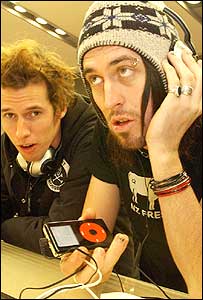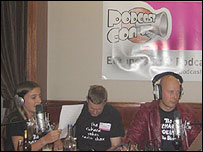|
By Jo Twist
BBC News technology reporter
|


You never know what people are listening to on iPods nowadays
|
Podcasters have already inspired conventional radio stations to evolve.
But their podcasts will increasingly be on the radar of traditional radio broadcasters as fertile grounds to feed the desire for new talent, and ideas.
Both the BBC and Virgin will watch what podcasters do, learning from them, just as podcasters learned from radio.
"It won't be too long before this [podcasting] becomes the normal route to discover new talent," says Chris Kimber, head of BBC Radio Interactive.
He was just one of more than 100 podcasters at Europe's inaugural podcasting conference, in London - PodcastConUK.
Podcasts are like radio shows done by anyone with a microphone, high-speed net connection and a computer. The shows are put online for anyone to download or subscribe to. It is barely a year old.
It is a phenomenon that could have been a big threat to conventional radio's business because suddenly they were not the only ones making and distributing programmes.
Instead, it is being seen as a big opportunity, for both "professionals" and "amateurs", according to both the BBC and Virgin Radio.
Even those distinctions might have to change soon, given its impact. "The phrase 'amateur podcaster' should be banned," thinks James Cridland, head of strategic development at Virgin Radio.
Not just about control
Podcasting has exploded not just because it gives people more control of what they want to listen to, when they want to or because, once subscribed to, the latest shows are delivered automatically to digital music players.
Neither is it because podcasts let people listen to the bits within programmes that they want to, whizzing through the dull bits.
"A few months ago, you could guarantee that everyone listening to an iPod was not listening to radio," explains the BBC's Mr Kimber, who says it is part of its job to introduce mass audiences to podcasting.

Podcasters are going to be fertile ground for new ideas
|
"It was excluded from iPods."
Now, those easily identifiable white ear plugs might be piping through a radio show.
That, says Mr Kimber, could have posed a big threat to radio since there are 21 million iPods on the loose.
According to Virgin's Mr Cridland, 41% of its online radio users own a portable digital music player - 32% of them have iPods, and 68% own "something else".
The trend for portable programmes giving people the freedom to take their programmes out and about with them to listen to on portable devices is only part of the story.
The other key to its appeal, say the BBC and Virgin, is about netting new audiences and opening people's ears to new programmes.
"That audience is maybe people who don't listen to Virgin radio but bump into us in a podcast," explains Mr Cridland.
Mr Kimber says podcasting introduces to programmes they would never usually listen to. That obviously includes bumping into the shows that are not related to traditional broadcasters too.
In an online survey, 18% of the Virgin listeners said they first heard shows on a medium other than "radio", said Mr Cridland.
"Bumping into us on a non-traditional platform is very important to us," he says.
So too is the value, which Mr Cridland says Virgin has recognised, in the ability to listen to past shows.
Restoring radio's heart?
To mainstream radio production powerhouses such as the BBC and Virgin, podcasting is seen to be "putting the heart back into radio".
To most podcasters outside of mainstream media, it is about having a much more level playing field which means that anyone with a microphone, computer and a broadband connection can be a creator and distributor of content.
Podcasting, says Mr Kimber, focuses attention much more on the content of a show, now that the ability to make and distribute shows has been prised out of main media's clutches.
It is clear that podcasting has really shaken up the radio world. But are the powerful media outlets intent on re-claiming that power, or are they genuinely interested in listening to the average Joe on the street?
"It is a chance for the 'little guy' to reach the top of the tree," says Mr Cridland.
Podcasting's popularity, which has been boosted by the inclusion of podcast directories in iTunes, means that traditional radio has to resist resting on its laurels because there is suddenly a lot more serious competition.
In the short term, thinks Mr Kimber, this is likely to affect the types of programmes that get commissioned for the BBC radio output.
Just as video on mobile requires new thinking about what kinds of programmes, show lengths, quality and so on, so do does podcasting.
The way in which the UK's traditional radio networks "does" podcasting, in the majority of cases, is by chopping out unusable bits, such as licensed music and news or time stamps, to make them stand alone as podcasts.
There are sometimes issues with taking these shows out of a wider programme's context.
In the longer term, says Mr Kimber, the quality of what listeners get from conventional radio will improve, partly because of podcasting's impact and its novel ideas about what and who people want to listen to.
At PodcastConUK, Mr Cridland announced that Virgin's new unsigned band show, Virgin Radio Extreme, had been created with podcasting at its heart.
The entire show, because it features unsigned bands eager for exposure, is a podcast.
Another newly-announced show features the best of the old and new shows that have been broadcast on Virgin. There is a possible Vic Reeves podcast in the works too.

~RS~q~RS~~RS~z~RS~35~RS~)